How To Increase Your Probiotic Intake (+ Giveaway!)
- July 28, 2017
- Last Updated: July 10, 2023
- 13 Comments
- Nutrition
Thank you to Lifeway for sponsoring this post and giveaway. As always, all opinions shared are my own.
Happy Friday lovelies! Today we’re talking about probiotics and why they’re so great. And stay tuned until the end, I have a fun giveaway where you can win a month’s supply!
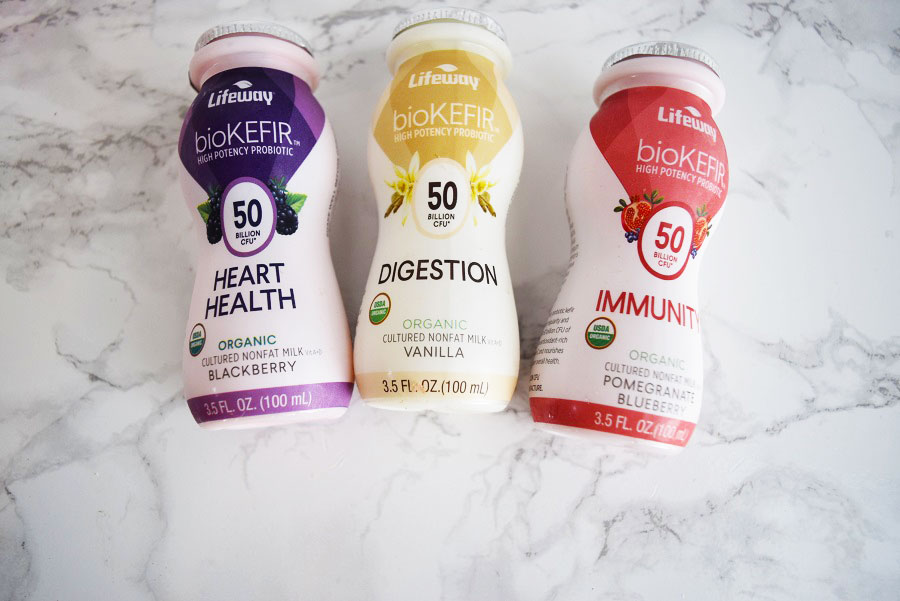
I’m so glad it’s Friday. It’s been a busy week and I have a fun weekend ahead! I may try to play around with video this afternoon, and I’m looking forward to curling up on the couch with a good book and some wine tonight. I’m planning on hitting up the Farmer’s Market Saturday morning before a brunch with friends, and then some dinner plans. And Sunday, we’ll probably get everything ready for our trip to Rhode Island.
But until then, let’s talk about probiotics! 🙂
Probiotics are one thing I talk with all of my clients about at some point throughout our meetings. They’re trendy, but they are also health promoting and very beneficial, so I think it’s great to have an understanding of them.
What are Probiotics?
Probiotics are derived from the Greek word, meaning “for life.” Probiotics refer to live bateria that can help benefit our health by allowing the healthy bacteria in our GI tract to thrive, while also inhibiting/destroying toxins released by other bacteria.
Did you know that our human cells are outnumbered by bacteria? According to the National Institutes of Health’s Human Microbiome Project, the human body has more than 10 times the number of bacteria as the number of cells.
So, we’re not only outnumbered, we are VASTLY outnumbered. While these bacteria cover the entire body, the most diverse population is found within the GI tract, where they help digest food, generate vitamins, and combat pathogens.
Probiotics have many health benefits and are used for many chronic health conditions. Some benefits include:
- Synthesizing Vitamins (particularly B vitamins)
- Boosting the immune system (70-80% of your immune system is found in your gut!)
- May decrease the risk of allergies
- May help with depression and anxiety
- Can help with skin health or acne
- Reducing symptoms of IBS
- May help those with lactose intolerance digest dairy more efficiently
I’m fairly certain we’ll find out about more benefits in the near future!
Where to Find Probiotics
With some clients, we discuss probiotic supplementation, but oftentimes, we’re discussing the main FOOD sources of probiotics! Foods like kefir, yogurt, cottage cheese, soy sauce, miso, kimchi, tempeh, sauerkraut and kombucha all provide some dietary sources of probiotics.
Have you tried kefir? Lifeway recently sent me a bunch of their new stuff to try and I am loving it! I’ve always been a huge fan of yogurt, but now I’m on the kefir train as well.
Lifeway Foods is the largest producer of probiotic kefir in the United States. And they come in multiple flavors, which can be good to start with if you’re feeling hesitant.
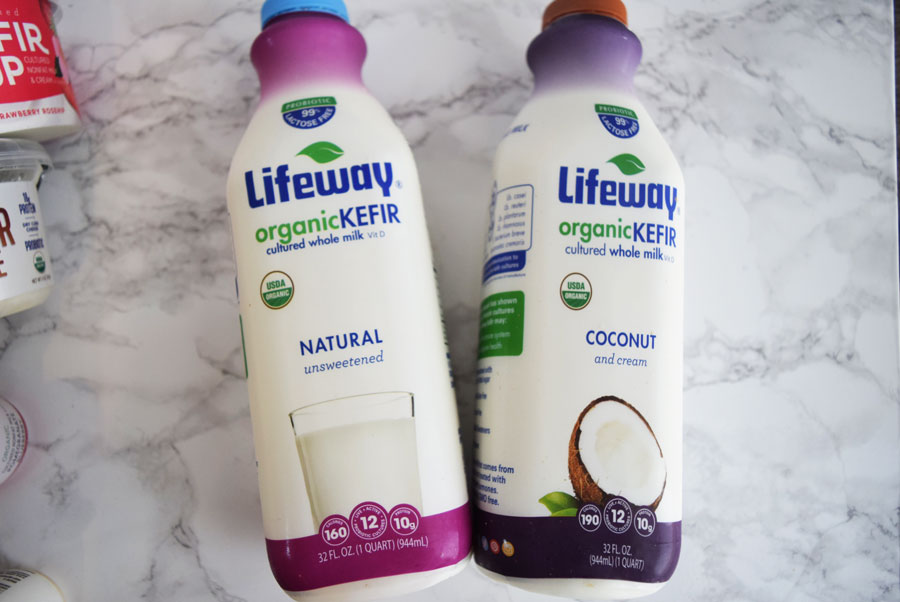
Kefir is a tart and tangy cultured milk – as expected, it is high in protein, Vitamin D and calcium. But it is also bursting with good little gut bugs. Each of Lifeway’s kefir blends contains 12 live and active cultures.
Kefir is also 99% lactose free, which makes it a great option for those who may not be able to tolerate other dairy products. For those who are turned away by the idea of “drinkable yogurt,” Lifeway also offers farmers cheese and kefir cups and other supplementation.
I love adding cereal for a crunch on top.
How much is enough?
Research on probiotics is still happening and has a ways to go. There are tons of different strains out there.
You may have heard of some of the more common strains, like Lactobacillus and Bifidobacterium. Those are most commonly found in yogurts and things.
When looking at probiotics, you’ll see the term, CFU, meaning colony forming unit, which refers to the amount of live organisms. You’ll also see the amount of strains that are included.
While it may vary depending on why you want a probiotic (general health vs. IBS vs. constipation, etc), scientific studies have determined health benefits from 50 million to more than 1 trillion CFUs per day. Know that a probiotic with higher CFUs doesn’t necessarily equal better quality.
You want to ensure the supplements contain the live microbes in adequate amounts as reflected in the literature.
Certain strains are better researched for certain conditions, so I’d recommend talking to a doctor or dietitian if you are looking for something specific. I tell my clients who are taking a probiotic for general health to look for multiple strains.
Lifeway’s general supplement for “gut health” has 30 billion CFU’s and 10 different strains.
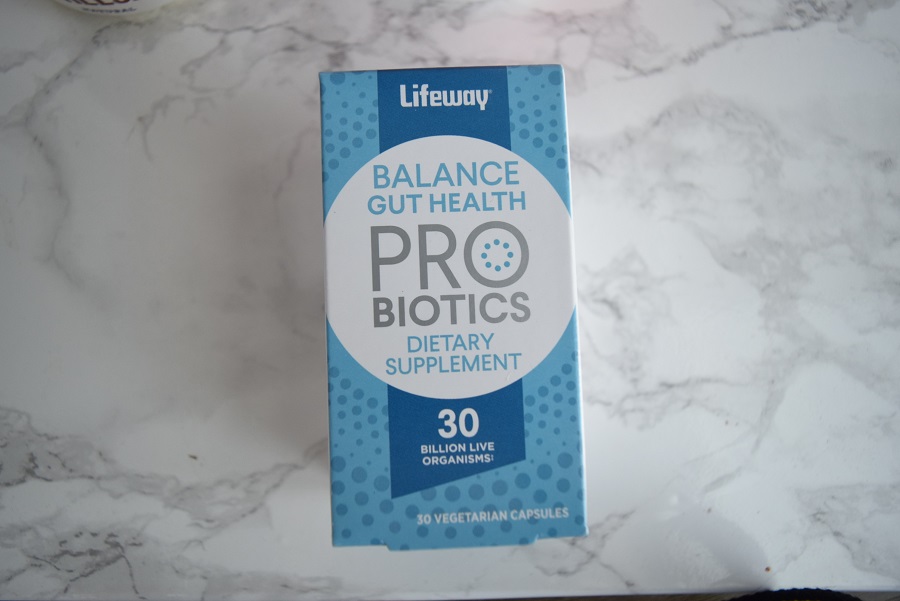
Prebiotics
There’s more, though. Like us, probiotics have to “eat” to survive. They thrive on what we call prebiotics – essentially, fuel for the probiotics. Prebiotics are non-digestible substances that stimulate the growth or activity of bacteria so they can thrive in the GI tract.
They work by decreasing the pH of the colon to enhance vitamin and mineral absorption.
Some research shows that prebiotics may decrease the risk of cardiovascular disease, colon cancer and help reduce cholesterol. And, these are things we get through food also!
Where to Find Prebiotics
- chicory root
- artichokes
- bananas
- onions
- garlic
- leeks
- wheat, barley, flax
- oatmeal
- legumes
- asparagus
- leafy greens
- berries
- bananas
- honey
Many of these prebiotic foods have one thing in common – FIBER! There’s a reason we, as dietitians, tell you to focus on fiber, fruits and veggies. Fiber is good for us for so many reasons.
I love combining many of these ingredients in smoothie bowls. Perfect way to get your prebiotic + probiotic intake for the day!
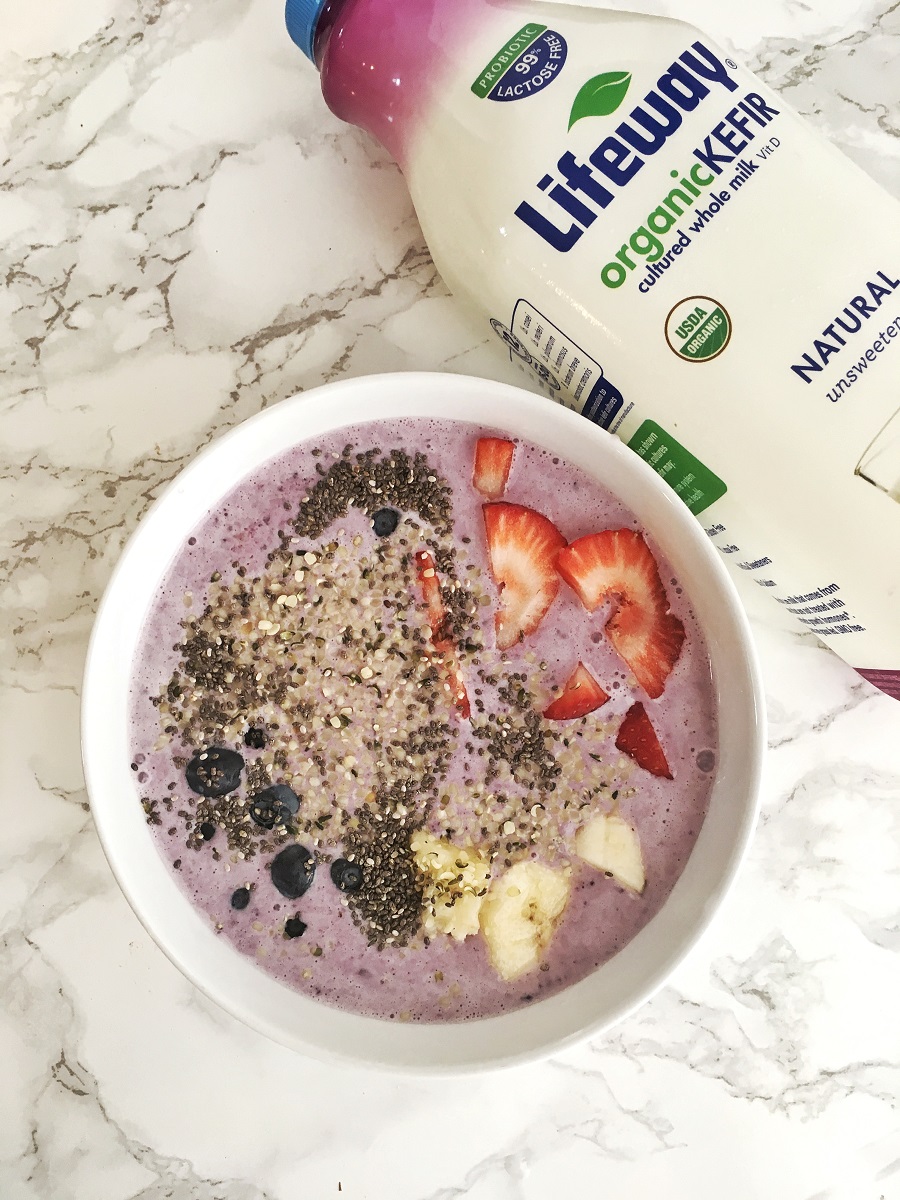
And Lifeway is offering you a chance to win a one month supply of Lifeway Kefir! Plus, three winners will receive product coupons as well. Head over to Instagram to enter the contest.
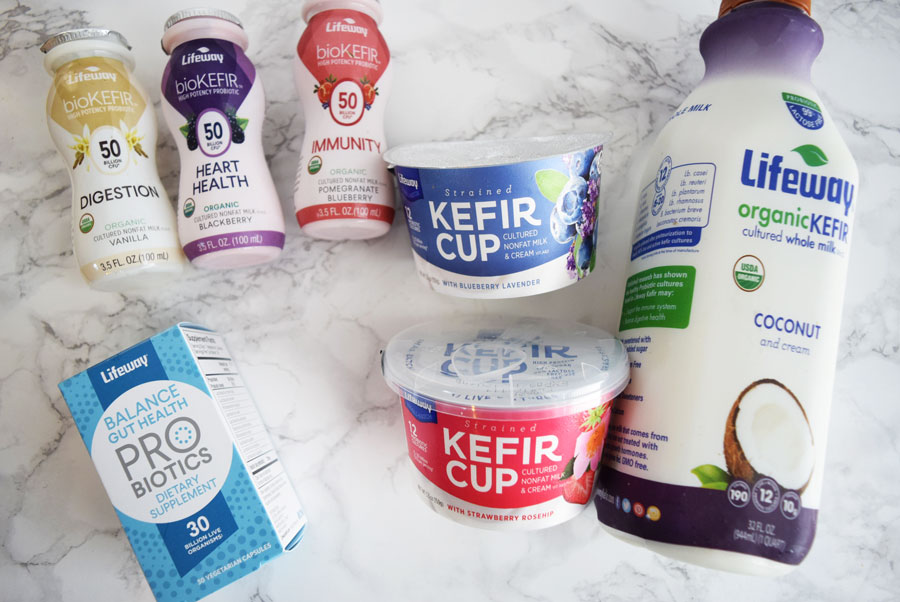
Thanks for stopping by the blog today. Hope you have a great weekend!
Do you take probiotic supplements or enjoy probiotic foods?
Explore More Recipes
NutritionSupport Bucket List Tummy

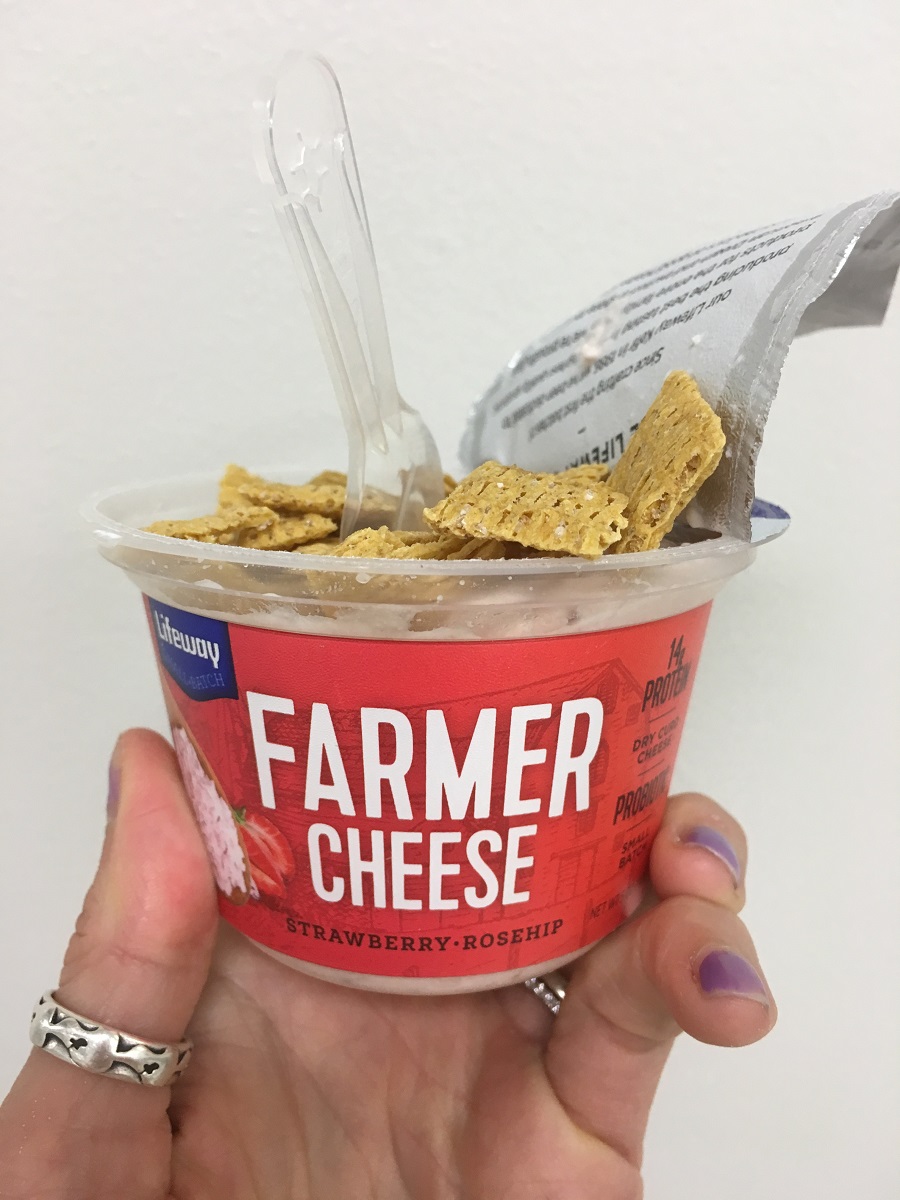



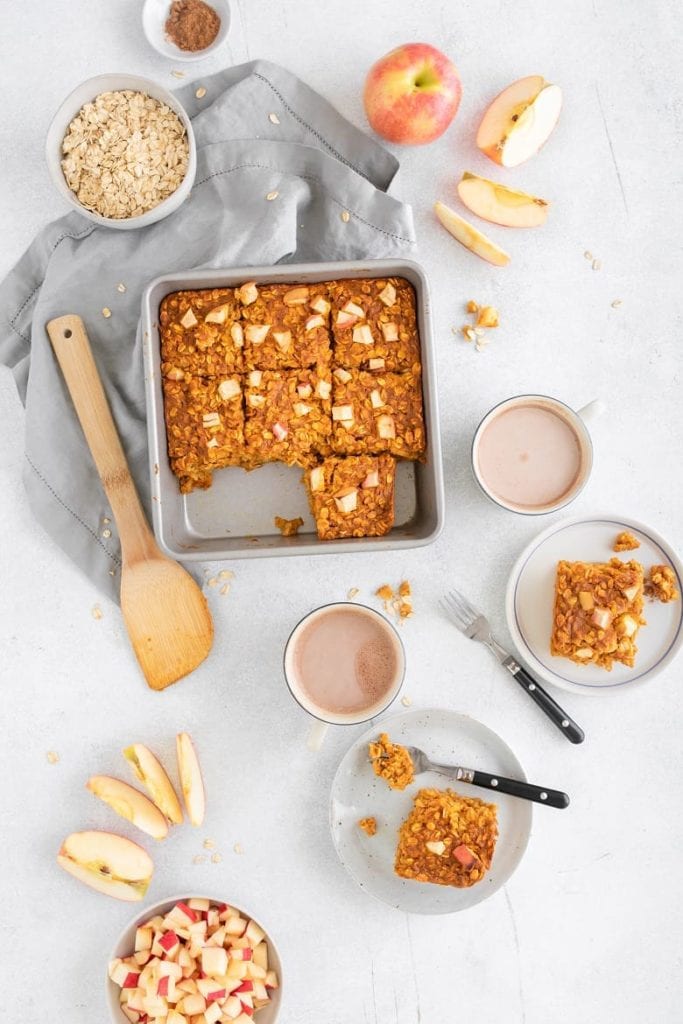


Like This Content?
Support Bucket List TummyThanks for all the valuable information! I learned a lot!
So happy it was helpful. Thanks for reading, Madelyn!
Thanks for breaking all this down. Makes it much easier. I have been going back and forth about giving my child a probiotic and this is helpful.
Thanks for this post! I’ve been interested in probiotics lately but have never tried them. This is really informative – I might go buy some today!
Have a great weekend 🙂
So glad you found it helpful, Marina 🙂
Always great to spread the importance of gut health and how it affects everything else.
I agree!
Thanks for going through these! I prescribe probiotics sometimes but haven’t had any experience with prebiotics yet–twas nice to get this clarification! :] I wanna try that pomegranate bluberry kefir! *-*
It’s really yummy! I highly recommend 🙂
I’ve taken probiotics for a few years. I really should start incorporating more fermented foods into my diet! Sauerkraut adds so much flavor to any meal, but I always forget how much I like it, haha. Just looking at your sample list of prebiotic foods though, I’m doing great in that department.
xxMeah
Love my prebiotic foods, too! Sauerkraut is a good compliment to salads, sandwiches!
Ooo you’ve been reading my mind. You answered a few questions I’ve been trying to sort out lately (what is the difference between pre/probiotics? What is a strain? etc). I’m still confused a bit as to what you mean when you say “contains 12 live and active cultures.” I see those kinds of nutrition statements everywhere, but how do I know what number of “active cultures” is actually good? Is 12 higher than most things? Marketing could simply just be making themselves look good by placing any sort of number on their packaging (we are suckers for fancy numbers), ya? Regardless, I’ve been really wanting to try Lifeway – specifically because I know they have lots of different flavors. I’m also one that doesn’t love the idea of drinkable yogurt so I’d be all over the farmers cheeeeeese.
I think it can be a huge marketing scheme, but generally, I’ve seen anything over 10 being good for general health (variety of strains). If it was for a specific condition, you may only need 1-2 strains/active cultures. The farmer’s cheese is really good – they have lots of yummy flavors!